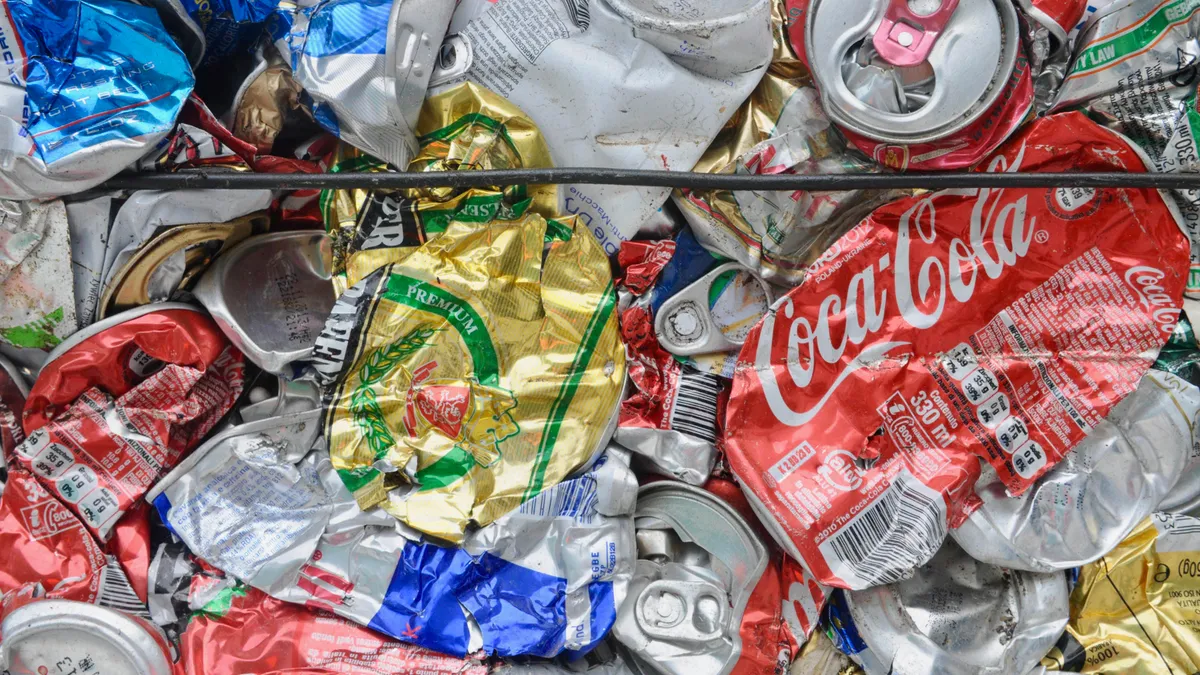Dive Brief:
- The Can Manufacturers Institute has funded a two-year lease for an AI-powered robot at a California MRF. It’s a new type of partnership for the organization meant to incentivize higher can collection volumes at MRFs in exchange for a share of the profits.
- Caglia Environmental installed an EverestLabs robot on its “last chance” line at its facility in Fresno, California. Caglia will share 50% of the revenue from the used beverage cans it captures during the lease period with CMI, and it expects to capture about 1 million UBCs a year with the new equipment.
- CMI financed the lease using funding from two of its members, can manufacturers Ardagh Metal Packaging and Crown Holdings, which have also provided funding for other MRF infrastructure projects in the past, the companies said in a news release.
Dive Insight:
This lease program is the latest in a multi-year effort CMI has undertaken to collect more cans from MRFs. CMI estimates one in four UBCs is missorted in a typical MRF, and the organization sees investment in sortation infrastructure as an ideal way to generate more revenue for recyclers while connecting can manufacturers with higher volumes of valuable, clean feedstock for new products.
The lease model “highlights that aluminum beverage cans are consistently one of the most valuable recyclable commodities and further exemplifies how this recycled beverage container pays its own cost of recycling due to that high market value,” said John Rost, vice president of global sustainability and regulatory affairs at Crown, in a statement.
Caglia’s Cedar Avenue Recycling and Transfer Station, known as CARTS, recently upgraded its single-stream sort line. The newly leased robot is on the very end of the sort line and is programmed to capture UBCs the company says would have otherwise ended up in the landfill because they weren’t sorted out earlier in the process. So far, the equipment has counted about 1,400 UBCs per day and is recovering most of them.
“It’s picking ‘gold’ out of the trash,” said Corey Stone, plant maintenance manager at CARTS, in a statement. Stone described the lease agreement as “a no-risk, no-cost” way for Caglia to further its goal of capturing all recoverable material at its facilities.
The EverestLabs robot will also help generate data the MRF can use to measure its progress. The equipment includes a 3D depth-sensing camera. An AI technology and automation platform provides daily reports on the number of missorted UBCs, along with the estimated economic value of the cans and the greenhouse gas emissions saved from recycling them, said Jagadeesh Ambati, founder and CEO of EverestLabs, in a statement. “With new investment models, we can speed adoption of AI solutions to eliminate losing UBCs to landfill,” he said.
The companies haven’t yet said what will happen with the equipment when the lease is up, but CMI said it could either extend the lease, allow Caglia to “deploy the robot on its own” or decide that neither party will continue with financing operations.
“Whichever route is taken, we believe the data will show that EverestLabs’ robot is capturing a significant amount of high-value material that supports continued financing from CMI, the MRF or another entity,” CMI said in an emailed statement.
CMI, Ardagh and Crown say they’re interested in additional financing models for such projects and plan to continue working with EverestLabs and other vendors. In each case, CMI will likely pay for most or all of the equipment in exchange for a revenue share.
Though this is the first lease program Ardagh and Crown have financed through CMI, the companies have funded other infrastructure projects before — typically taking the form of grants offered through The Recycling Partnership. Some of those grants went toward helping MRFs to automate aluminum sorting instead of relying on hand sorters, upgrading a MRF’s eddy current separator or installing new equipment meant to detect aluminum in the plastic container stream.











